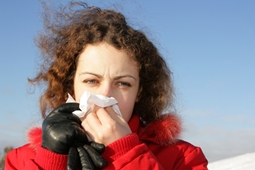Seasonal flu can increase the occurrence of illness in the workplace and result in lost work time. Flu season typically begins when cold weather strikes and can last into spring. For many people, the seasonal flu is a mild illness, but for others it can result in serious infections or hospitalization.
Preventive health measures are even more necessary during this season and workplaces of every type should be proactive to keep employees safe and business operating as usual.
Preventative Measures:
Encourage employees to take precautions to reduce the spread of the flu.
-
Provide hand washing stations or hand sanitizer.
-
Tissues should be discarded immediately after use - provide waste receptacles.
-
Thoroughly clean work stations, door knobs and telephones.
-
Educate your employees - share prevention tips and information.
-
nitiate discussions with companies that provide temporary or contract employees.
-
Contact your local health department and other organizations for up-to-date information.
-
Initiate discussions with companies that provide temporary or contract employees.
-
Contact your local health department and other organizations for up-to-date information.
Vaccinations:
Health professionals recommend a yearly seasonal flu vaccine. Everyone over the age of six months is encouraged to get vaccinated.
-
Work with your health insurance company to provide information to employees.
-
If possible, create opportunities for on-site vaccinations or coordinate with a local health clinic that can accommodate your employees.
If Your Employees Contract the Flu:
Flu symptoms include fever, headache, extreme fatigue, cough, sore throat, runny or stuffy nose, muscle aches and stomach symptoms. Those with the flu should avoid contact with others and doctors may prescribe antiviral medication or suggest over-the-counter remedies.
-
Employees in the work place exhibiting flu symptoms should be sent home.
-
Ill employees should be encouraged to stay at home.
-
The CDC recommends that employees with flu-like symptoms should remain at home until at least 24 hours after they are free of a fever.
-
Employers should be flexible about sick leave.
-
Be aware of school closures that may impact employees with children.
Pandemic Plans:
If a pandemic occurs in your community or if a large percentage of your employees become ill, you need to have plans in place to ensure the health of your employees and your business' future.
-
Consider flexible schedules or telecommuting.
-
Cancel non-essential travel.
-
Utilize teleconferencing or online meetings in place of large in-person gatherings.
-
Know who to contact in your local health community if a flu outbreak occurs.
-
Identify critical functions required to maintain business operations and develop plands to staff those if assigned employees are ill.
-
Communicate pandemic plans with employees.
For more information on flu season...
Centers for Disease Control and Prevention
US Government H1N1 Avian and Pandemic Flu Information - Business Planning









